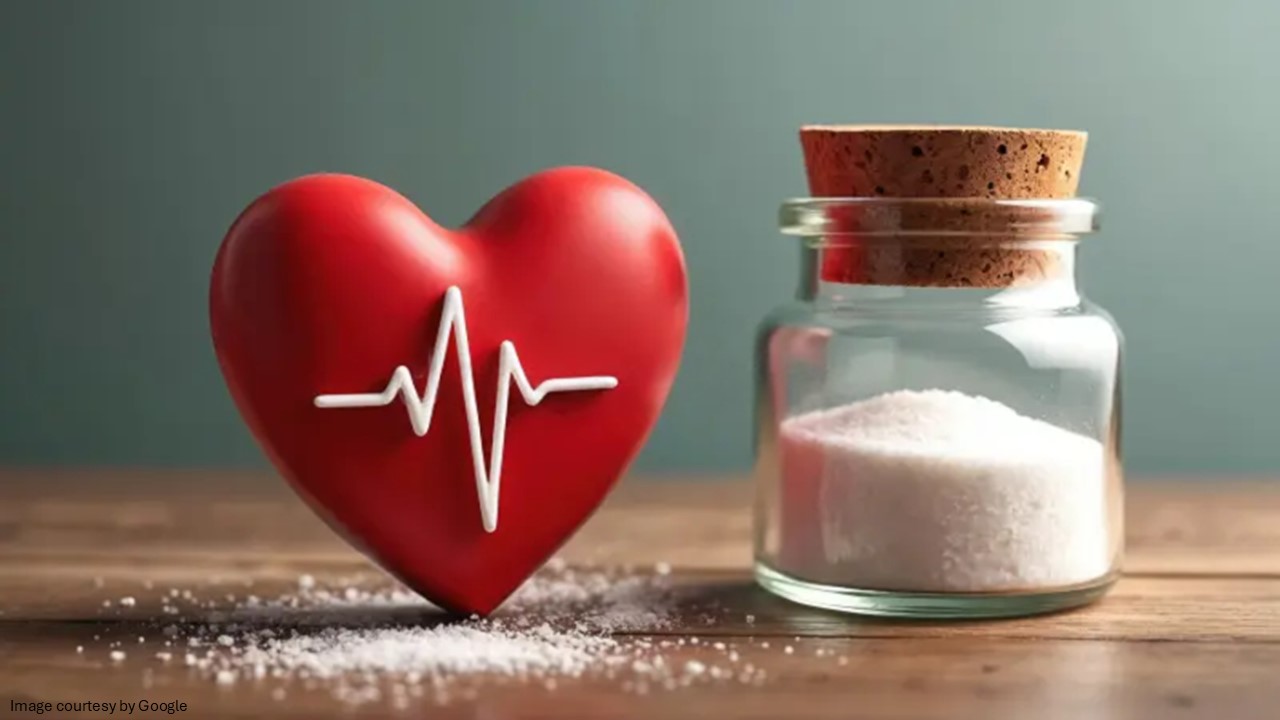The association between salt intake and high blood pressure is well established, as excessive salt intake can have a negative impact on blood pressure. This article will help you learn the relation between salt and blood pressure and explain how your body responds to high or low salt intake.
One of the heart-healthy eating habits involves moderate intake of salt, which makes sense. Data suggest that in the USA, the average individual consumes the equivalent of about half a teaspoon of salt per day, which is approximately 50% more than the recommended amount. Having too much sodium (a main component of salt) is closely associated with having high blood pressure. But every individual responds differently to sodium. It has been estimated that about 60% of hypertensive individuals are salt sensitive, which means they have a strong response to dietary sodium. In such individuals, blood pressure increases by 5 points or more when they transition from a low-sodium to a high-sodium diet.
Moreover, data suggest that one in 10 people develop inverse salt sensitivity, their blood pressure elevates when they consume less salt. Well, there is no easy way to recognise people who are sensitive to salt or insensitive to salt. Additionally, many people fall somewhere in between those two extremes.
The effect of sodium on blood pressure
Does salt raise blood pressure? How does salt affect blood pressure? These are some basic questions we should know the answers to.
Yes, high salt intake can lead to a rise in blood pressure. Generally, your body responds to excessive salt intake by holding onto water to dilute it. This causes an increase in the fluid present in blood vessels, which raises the pressure inside them and causes the heart to work harder. Moreover, an excessive amount of sodium in the body counteracts the beneficial effects of two types of blood pressure medicines, namely vasodilators and diuretics (blood thinners). Vasodilators cause relaxation of blood vessels, while blood thinners help flush excess fluid and sodium out of the body, allowing for the retention of additional fluid and the refilling of your relaxed arteries, putting you back where you started.
Cutting down on salt intake is one of the simplest ways to reduce blood pressure, and it will begin to make a noticeable difference within your body, sometimes within weeks. Excessive salt consumption not only contributes to high blood pressure but also leads to kidney disease, stroke, heart disease, and some types of dementia. Environmental conditions play a significant role in the development of high blood pressure, alongside genetic factors. According to current international guidelines, it is recommended to reduce dietary sodium to no more than 6 g salt per day to prevent a hike in blood pressure. The current intake of salt in industrialised countries is approximately double the suggested amount.
Salt restriction and blood pressure restriction
Numerous research studies have demonstrated that dietary factors play a crucial role in preventing and managing high blood pressure. Can salt lower blood pressure? Low dietary sodium intake is particularly effective in preventing high blood pressure in patients with an increased risk, such as those with borderline hypertension, being overweight, or being elderly. It has been shown that restricting salt intake can lower blood pressure. A low-sodium diet, combined with antihypertensive therapies, results in blood pressure reduction, regardless of race or ethnicity.
Studies have revealed that reducing salt intake to a moderate level is associated with a reduced risk of cardiovascular issues; however, the research has provided no definitive evidence regarding the optimal sodium intake to prevent heart problems and mortality. Generally, reducing salt intake to a moderate amount is considered a cost-effective strategy to lower high blood pressure and associated cardiovascular complications. It is worth mentioning that non-compliance with salt restriction is considered one of the possible causes of tough-to-control and resistant hypertension.

Salt and hypertensive medicines
The hypotensive effect of calcium channel blockers, a type of hypertension medication, is less dependent on salt intake than other medications like diuretics or ACE inhibitors. According to clinical trials, calcium channel blockers combined with hydrochlorothiazide were the most effective medications for lowering blood pressure in individuals with salt-sensitive hypertension. In treated hypertensive patients, effective salt restriction can help reduce the number and doses of antihypertensive medications.
Is low salt intake dangerous?
Some research studies suggest that reducing dietary intake to below 2g of sodium a day could decrease blood pressure, but was associated with an increased risk of side effects in hypertensive as well as normal people. However, currently, there is no convincing evidence from research studies favouring low sodium intake over moderate intake in terms of reducing cardiovascular risks and adverse outcomes.
Sodium salt Vs potassium salt
Which salt is good for high blood pressure? Numerous research studies have demonstrated a direct relationship between high sodium intake and high blood pressure, as well as an inverse relationship between high potassium intake and high blood pressure. Additionally, it has been repeatedly demonstrated that increasing potassium salt intake and reducing sodium salt consumption can lower blood pressure, improve overall health, and decrease salt sensitivity. This is the reason why it is recommended to replace sodium salts with potassium salts. Foods high in potassium include apricots, raisins, beans, lentils, spinach, avocados, bananas, and potatoes.
High blood pressure diet: The DASH diet
The DASH diet is well-known among patients with hypertension. DASH is defined as the “dietary approaches to stop hypertension”. The diet is not only low in sodium but also loaded with nutrition. It emphasises whole foods that are considered extremely healthy. It includes fresh fruits, vegetables, whole grains, and lean protein. The DASH diet meal plan can help hypertensive patients manage their blood pressure while also offering additional benefits, including more cancer-fighting flavonoids, gut-friendly fibre, vitamins, minerals, and antioxidants. Reports of research studies suggest that if your blood pressure is elevated, the DASH diet may bring it back to normal.
Conclusion
Dietary salt has a bidirectional effect on blood pressure, and several research studies have shown that high salt intake is associated with increased blood pressure. In contrast, low salt consumption decreases blood pressure and, consequently, the incidence of cardiovascular disease. Many food products contain a significant amount of salt, and it is essential to be aware of the salt content in one’s diet to avoid excessive consumption.
The connection between high salt intake and high blood pressure is clinically proven, and all international guidelines recommend lowering dietary salt intake as one of the proven measures to cause a significant reduction in blood pressure. It is recommended to limit salt consumption to moderate amounts, as consuming less salt in the diet may help prevent adverse cardiovascular issues. Salt and high blood pressure myths continue to resurface, but awareness about the risk of excessive dietary salt intake remains crucial. Additionally, knowing the available measures to replace an unhealthy diet with a healthier one is key.



